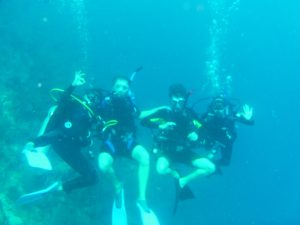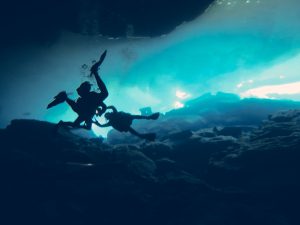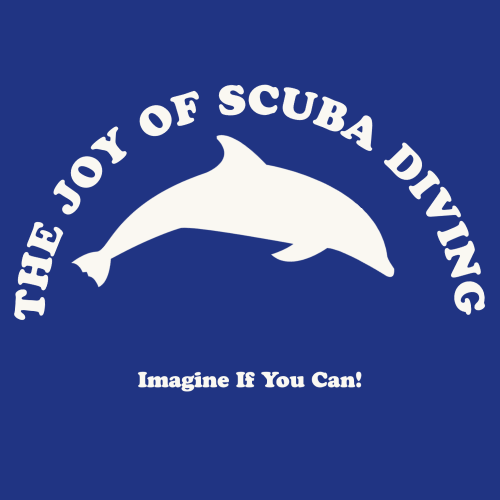If you’re thinking of learning to dive, you’re probably wondering what is recreational scuba diving all about?
A recreational scuba diver is someone who dives for the pleasure of leisure and enjoyment and considers the dives a sport. It’s different from professional and technical diving.
the dives a sport. It’s different from professional and technical diving.
‘From birth, man carries the weight of gravity on his shoulders. He is bolted to earth. But man has only to sink beneath the surface and he is free.’
by Jacques Yves Cousteau (the Father of Scuba Diving)
Yes, thanks to Jacques Yves Cousteau and his partner, Emilie Gagnan with their invention of the ‘modern scuba gear’. Their demand valve system allowed divers to receive compressed air when inhaling. Divers all over the earth now have the opportunity to explore the mysteries and the beauty of the underwater world.
Millions of people are now certified recreational divers!
What does Scuba Diving mean?
The word Scuba is an acronym for ‘Self-Contained Underwater Breathing Apparatus’. It’s an apparatus that the diver carries on his back and has absolutely nothing to do with anything above the surface.
How can you become a recreational diver?
The most popular and recognized scuba diver training agencies in North America are PADI, SSI, SDI and NAUI. These agencies specialize in providing standards, safe work practices and rules for people wanting to learning how to scuba dive recreationally.
There are dive shops and resorts who are affiliated with these agencies allowing you to finish your certification by completing open water dive requirements. Courses range from introduction, open water, advanced, rescue and upward to even becoming a scuba diver instructor.
Newly certified diver considerations
1) Some new divers believe that once they become a certified recreational scuba diver, they can also do extreme diving that are considered technical activities. Technical diving like cave diving, ice diving and mixed gas diving for example, require more in-depth training because of our human physiology.
There are professional divers who are paid to dive. They may be scientists, or perhaps they do projects for government and military. In any case, these Technical and Professional divers require additional skills and usually stay longer underwater. Further education and training are a must for them!
2) No matter what type of diver you are, whether recreational. technical or professional, our human body has certain effects when scuba diving.
For instance, when we descend underwater and breathe compressed air, our body will start to accumulate nitrogen for the certain period you remain underwater. The longer we remain underwater, the greater the nitrogen in our body.
At some point in time, we must start to ascend for 2 reasons – air consumption and the need to reduce the excess nitrogen that has been saturating our body.
In other words, the nitrogen has to leave our body. How fast that nitrogen leaves our body is extremely important and not controlling the release can leave nitrogen bubbles in our body. The only way to control the release is to slowly ascend.
Limitations of being a recreational scuba diver
Being a recreational diver myself, even though I have mentioned ‘limitations’ doesn’t mean they’re bad. It means being aware and applying these limitations to keep us safe as much as possible underwater. Let’s face it, the underwater world as magnificent it is, can feel strange and unnatural.
Consider these limitations as some of your guide to safety!
1) Buddy Dive System
You have another diver dive close to you. This means you look after each other’s safety. If you have leg  cramps for example, your buddy can massage your leg muscles underwater or if you are low on air, you and your buddy can do what’s called buddy breathing (you’ll learn this technique in your open water diver course) or use your buddy’s alternate regulator.
cramps for example, your buddy can massage your leg muscles underwater or if you are low on air, you and your buddy can do what’s called buddy breathing (you’ll learn this technique in your open water diver course) or use your buddy’s alternate regulator.
The buddy dive system is the recommended procedure when recreational diving.
PADI, SSI, SDI and NAUI teaches the buddy system to recreational divers.
2) Maximum depth for basic certifications – 60 ft/20m
3) Maximum depth for advanced certifications – 130 ft/40m.
If you dive beyond that, it’s considered technical diving and you will need to consider additional training and learn more conformed safety standards and rules.
Why is there a maximum depth rule of 130 ft/40m for recreational divers?
There are 2 reasons for this rule.
1) Nitrogen Narcosis (also known as the raptures of the deep).
Divers can become lethargic and have the feeling of being intoxicated. Studies have shown divers can also be affected when diving in shallow water and may not notice this. While not considered dangerous, it’s important to still remedy this by slowly ascending to a shallower depth. There are no long-term effects. Diving deeper than 130 ft/40m makes ntirogen narcosis unmanageable and certain training and methods are required to control this.
The advanced certifications allow divers to go 100ft/30m. Your instructor gives you a mathematical question to solve at this depth. It’s a great way to know if you are susceptible to nitrogen narcosis.
2) Decompression Sickness (DCS).
The deeper you dive, the greater your chances of decompression sickness, also known as the bends. While you are diving, your body accumulates nitrogen by breathing compressed air based on your surrounding pressure. This normally will not present a problem. The problem occurs however, when the pressure surrounding you is reduced too quickly. Nitrogen bubbles form in the body which causes extreme pain and sometime death.
As a best possible prevention to DCS, professional diver training organizations such as PADI, SSI, SDI and NAUI, their affiliate dive shops and resorts make it standard practice to teach students to do safety stops and slow ascents underwater.
What’s next?
Now that you have a better understanding of what recreational diving is all about, why not take the next step and connect with a professional diver training agency?
If you’re not sure yet about getting certified, that’s alright… let me tell you about an introduction course (no certificate) to diving. Just click here.
If you have already made up your mind, go to the best professional scuba diver training agency by clicking here and I’l tell you all about their e-Learning Open Water Diver course (certification).
Thank you for reading my article and I would like to hear from you. Any comments or questions are welcomed by writing in the comment box below!

I’ve held an Advanced Open Water certification since 1977. In my experience, the best recreational dives are in less than 30 feet of water. Deeper than that and the complexity and risks begin to increase.
Also, the deeper the dive the less color is visible, even in clear water. When diving for fun, I prefer to stay in closer to the surface.
Hi Gary, thank you for your comment! It’s wonderful to meet a fellow diver!
I absolutely agree with you. Most of my best recreational dives have also been around 20-30feet as well. More natural light and of course so much more to see.
I’ve been doing some great wall dives around 50 ft just hovering over the walls.. see some crabs in crevices.
Recently my husband and I went on a vacation to the Caribbean and we were introduced to something called SNUBA – a mix between snorkeling and scuba diving. They claimed it was “Scuba for Ultra Beginners”. We aren’t qualified scuba divers, but for this you didn’t have to be as you only go down 10-15 feet or so. The oxygen tanks stay in a small boat on the surface, and you are attached to it with lines, so you can’t get too far from the instructor or other divers. We found it was a really great way to get introduced to scuba diving – it felt really safe, and gave us practice breathing into a scuba apparatus, without requiring us to go really deep.
Recreational scuba diving for beginners like you describe here seems like it’s the next step – and way more learning is involved – no “day trip out”. I’d love to give it a try though, the next time we head down to an area with great scuba diving! Snuba was fun, Scuba would likely top it by far!
Hi Marlaine,
Thank you for your comment! I’m glad you and your husband had fun SNUBAing! It does sound like a lot of fun… I’ve never tried it before. I have met some people who got certified into PADI as divers just after they did the SNUBA! You’re on your way to the next step and PADI does offer eLearning (the manual stuff) that you can both do at home or anywhere you like and then hook up with a dive shop or resort to finish the Open Water Certification. That way, it would only take you 2 days during your holiday to do your required open water dives and not spend time studying from a manual…
Let me know if you have any questions!